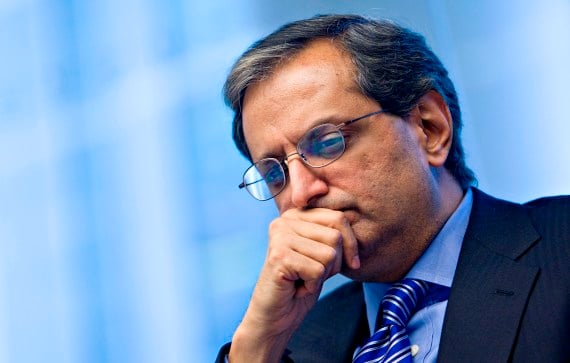Gain from sale included in non-GAAP numbers in 2009 -- but hit from recent write-down wasn't
What Citigroup Inc. has always needed is a leader who will be straight about the company's finances, without spinning the facts. For that reason, the departure of Vikram Pandit as chief executive officer is progress.
To see the sort of games that Citigroup has been playing the past few years, check how the bank presented the results in its third-quarter earnings release on Oct. 15, the day before Pandit resigned. Under generally accepted accounting principles, the company said it had net income of $468 million for the quarter. On a non-GAAP basis, though, Citigroup said its earnings were $3.3 billion.
One of the items Citigroup excluded was a $2.9 billion loss related to selling its stake in its brokerage joint venture with Morgan Stanley. (MS) This is about as funny as you will ever see accounting humor get, and here's why.
Back in mid-2009, when Citigroup first entered into the deal with Morgan Stanley, then known as Morgan Stanley Smith Barney, it recorded a $6.7 billion gain on the transaction. However, it didn't tell investors to exclude that gain from its non-GAAP financial measures as part of its second-quarter 2009 earnings release. It's easy to see why: Without the gain, Citigroup would have shown a quarterly loss.
At least Citigroup isn't trying to make any pretense that the dueling non-GAAP treatments were consistent with each other. Asked to explain the company's rationale for excluding the big loss, a Citigroup spokesman, Mark Costiglio, e-mailed me a one- sentence statement: “In both cases, the gain and/or loss on MSSB was visible, transparent and included in our earnings.”
In other words (and these are my words, not his), if you were fooled into thinking the loss didn't matter, then that's your problem.
That anecdote captures what it was like to watch Citigroup communicate with the outside world during Pandit's tenure as CEO, which began in December 2007. In November 2008, after repeatedly insisting the company had “very strong capital,” Citigroup took the second of its three federal bailouts.
Pandit, 55, stuck to the story that Citigroup was a healthy institution when it got bailed out. In March 2010, he told a congressional oversight panel that short sellers were to blame for the bank's problems. That was never a credible explanation.
Last year, thanks to documents released by the Financial Crisis Inquiry Commission, the public learned that the U.S. Office of the Comptroller of the Currency had sent Pandit a letter in February 2008 describing numerous ways in which Citigroup's internal controls were inadequate. Eight days after that letter, Pandit certified that Citigroup's internal controls were effective. It's still a mystery how he or Citigroup justified doing so.
So it's no wonder that Citigroup's stock is trading for just 59 percent of book value, or common shareholder equity, which tells you that investors don't trust the numbers on the company's balance sheet. The public can't even get a clear explanation from Citigroup or Pandit about the circumstances of his departure. In a news release yesterday, the board said Michael Corbat, 52, had been elected CEO, and that Pandit resigned after “guiding Citi through the crisis and positioning it well for the future.” (Corbat had been CEO of Citigroup's operations in Europe, Africa and the Middle East.)
In a memo to employees, Pandit said he was the one who had “decided to step down as CEO of Citi.” Within hours of his departure, Bloomberg News reported that Citigroup directors had ousted Pandit because of mismanagement and lack of credibility with investors, citing an unidentified person familiar with the board's discussions. That explanation makes more sense than the idea that Pandit quit on his own.
Citigroup shares dropped almost 90 percent while Pandit was CEO. Maybe most of that can't even be blamed on Pandit, but some of it can. (If it hadn't been for the government, the stock would be worth nothing.) Pandit had little experience as a commercial banker before he took the job, and never seemed cut out for the role.
Now comes Corbat, who one hopes has the sense to know that, along with making money, the most important measure of progress at Citigroup will be a simple one: Citigroup needs to show it can be trusted.
--Bloomberg News--
(Jonathan Weil is a Bloomberg View columnist. The opinions expressed are his own.)







